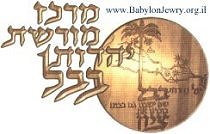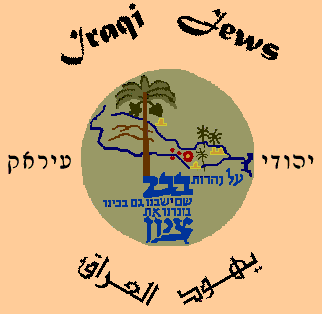Jews deserve justice too
Israel Hayom
September 14, 2012
By: Dror Eydar
The U.N. and the U.S., with the help of the Arab League, are perpetuating the Palestinian refugee problem — a perfect tool with which to bash Israel. On the opposite side, shockingly and hypocritically, no one gives a second to the 850,000 Jews who were displaced from Arab countries by means of violence, looting, threats and murder.
At the beginning of the week I had the chance to take part in a rare historic event: the first official conference on the issue of Jewish refugees, held under the auspices of Israel's Foreign Ministry in cooperation with the World Jewish Congress. The international conference was titled "Justice for Jewish Refugees From Arab Countries." For the first time in decades, the call for justice for the Jewish people was once again heard in Jerusalem. Not just a call for security, or apologetic Israeli discourse in the face of Palestinian calls for so-called justice, but a clear call, by Deputy Foreign Minister Danny Ayalon and Prime Minister Benjamin Netanyahu, to bring the issue of Jewish refugees back into every international arena: the ethical, legal, diplomatic and political arenas.
As one of the conference participants, former Canadian Minister of Justice Professor Irwin Cotler, said: “Where there is no remembrance, there is no truth; where there is no truth, there will be no justice; where there is no justice, there will be no reconciliation; and where there is no reconciliation, there will be no peace – which we all seek.” Indeed, this is a serious issue that has been neglected and kept silent for years, in stark contrast with the Palestinian refugee issue, which has become self evident and universally recognized in the context of the Israeli-Palestinian conflict. The Palestinians have become experts at marketing their victimhood to the world, and thus, the concept of a “just solution” became unilaterally linked to the Palestinian narrative. But just like every aspect of the Middle East story, here, too, the truth is far more complex.
With the exception of a few years prior to World War I, the Arabs living in this region never accepted the Jewish presence here. They rejected the various partition plans, ranging from the Peel Commission in 1937, through the 1947 Partition Plan, to the Oslo Accords and other generous Israeli offers. They were always willing to accept land, but never to sign a final agreement that would spell the end of the conflict.
***
In Nov. 1948, the U.N. appointed a task force to coordinate humanitarian aid work for Palestinian refugees. A short time later, the U.N.’s Economic Survey Mission issued its recommendation to resolve the Palestinian refugee problem by resettling them in Arab countries and integrating them in industry and agriculture there. That is how the United Nations Relief and Works Agency came about. Obviously, the plan never came to fruition, because the Arab countries refused to naturalize the Palestinian refugees. They were tasked with being the eternal victims — a means to bash Israel.
The Twentieth Century saw millions upon millions of refugees, products of various wars. Population changes occurred in many places around the globe. Millions of Sikhs and Hindus, for example, were displaced from Pakistan to India in the 1950s, and millions of Muslims, meanwhile, took the opposite route. This population exchange involved a lot of violence, but ultimately, it happened. Incidentally, then-Pakistani President Mohammad Ayub Khan visited Cairo in 1960 and voiced hope during a press conference there that the fact that his country absorbed some seven million refugees from India would serve as an example to Arab countries to absorb 750,000 Palestinian refugees.
But the status of Palestinian refugees is unlike the status of any other kind of refugee. The U.N. has two agencies that deal with refugees: the UNHCR which handles all the refugees in the world, and a refugee agency just for the Palestinians: UNRWA.
The U.N. also has two different definitions of refugee status: one is a general definition assigning refugee status to "people who are outside their countries because of a well-founded fear of persecution based on their race, religion, nationality, political opinion or membership in a particular social group, and who, for persecution related reasons, are unable or unwilling to return home." This definition affords refugee status for a limited number of years, and only to the displaced persons themselves, not their offspring. Under this definition, refugee status is revoked when a displaced person settles in, and integrates into another country. But not so when it comes to Palestinian refugees.
A Palestinian refugee is defined as “anyone whose normal place of residence was in Mandate Palestine during the period from June 1, 1946 to May 15, 1948, and who lost both home and means of livelihood as a result of the 1948 Arab-Israeli war." In short, anyone who lived here for two years prior to the establishment of the State of Israel is considered a Palestinian refugee who lived here “for thousands of years” since the biblical Jebusites ... And incidentally, only Palestinian refugee status can be passed down from generation to generation. Most of UNRWA’s budget comes from the U.S. and the EU, both of which are pushing Israel to resume negotiations with the Palestinians but are simultaneously helping to perpetuate the conflict.
***
Opposite the 600,000 or 700,000 Palestinian refugees, there are more than 850,000 Jewish refugees who were forcibly expelled from Arab countries over the establishment of the State of Israel and its victory in the 1948 War of Independence.
The Arab countries are ultimately responsible for creating the refugee problem, both the Palestinian refugee problem that resulted from a war waged by Arab countries against Israel, and the Jewish refugee problem, by stripping Jews of their citizenships, confiscating their property, murdering many of them and violently expelling the rest from the places they had populated for 2,500 years. All this, some 1,000 years before the rise of Islam.
It is important to get familiar with the testimonies of Jewish refugees. A good starting point is a website called The Forgotten Million, operated by the World Organization of Jews from Arab Countries. These Jews also lived in refugee camps for a time: the Israeli maabarot (refugee absorption camps). But, as opposed to the Palestinian refugee camps, the tents in the maabarot eventually became shacks, which then became permanent housing and ultimately cities.
And so, in stark contrast with the U.N.-fueled eternal refugee-hood of the Palestinians, these Jewish refugees integrated into their old-new homeland and were no longer of any interest to anyone. The term "pogrom" was seen as referring to violence only European Jews were subjected to. Furthermore, as Cotler mentioned, in the case of Arab Jews, the violence, the loss of citizenship, the theft of property and the expulsion reflected the stated policy of the Arab League, which had suggested a similar course of action against Jewish nationals back in 1947.
Now that the issue has gotten official state recognition, Israel’s representatives should raise the issue of Jewish refugees at every diplomatic event, and demand that justice be done. More than 150 resolutions having to do with Palestinian refugees have been adopted by the U.N. Not one has to do with their Jewish counterparts. It is time to change all that. By the way, U.N. Security Council Resolution 242 talks about a “just settlement of the refugee problem” — all refugees, including the Jewish ones.
And one more interesting historical note: the same thing that happened to the Jews half a century ago is currently happening before our very eyes to Christians living in Arab countries. The Christians of the Middle East are being persecuted, murdered and expelled. There is only one country in the Middle East where Christians thrive: Israel. That is an important public diplomacy tool.
But not only for diplomacy, it is also important for the sake of education. Every Israeli needs this. Without recognition of the Jewish “nakba” (the term Palestinians use to describe the catastrophe of their expulsion from Palestine), as some Jewish survivors describe their past, the resulting vacuum will have room only for the Palestinian version. “And you shall tell your son ...” as the Bible says.
Read MoreSeptember 14, 2012Posted on
Israel Hayom
September 14, 2012
By: Dror Eydar
The U.N. and the U.S., with the help of the Arab League, are perpetuating the Palestinian refugee problem — a perfect tool with which to bash Israel. On the opposite side, shockingly and hypocritically, no one gives a second to the 850,000 Jews who were displaced from Arab countries by means of violence, looting, threats and murder.
At the beginning of the week I had the chance to take part in a rare historic event: the first official conference on the issue of Jewish refugees, held under the auspices of Israel’s Foreign Ministry in cooperation with the World Jewish Congress. The international conference was titled “Justice for Jewish Refugees From Arab Countries.” For the first time in decades, the call for justice for the Jewish people was once again heard in Jerusalem. Not just a call for security, or apologetic Israeli discourse in the face of Palestinian calls for so-called justice, but a clear call, by Deputy Foreign Minister Danny Ayalon and Prime Minister Benjamin Netanyahu, to bring the issue of Jewish refugees back into every international arena: the ethical, legal, diplomatic and political arenas.
As one of the conference participants, former Canadian Minister of Justice Professor Irwin Cotler, said: “Where there is no remembrance, there is no truth; where there is no truth, there will be no justice; where there is no justice, there will be no reconciliation; and where there is no reconciliation, there will be no peace – which we all seek.” Indeed, this is a serious issue that has been neglected and kept silent for years, in stark contrast with the Palestinian refugee issue, which has become self evident and universally recognized in the context of the Israeli-Palestinian conflict. The Palestinians have become experts at marketing their victimhood to the world, and thus, the concept of a “just solution” became unilaterally linked to the Palestinian narrative. But just like every aspect of the Middle East story, here, too, the truth is far more complex.
With the exception of a few years prior to World War I, the Arabs living in this region never accepted the Jewish presence here. They rejected the various partition plans, ranging from the Peel Commission in 1937, through the 1947 Partition Plan, to the Oslo Accords and other generous Israeli offers. They were always willing to accept land, but never to sign a final agreement that would spell the end of the conflict.
***
In Nov. 1948, the U.N. appointed a task force to coordinate humanitarian aid work for Palestinian refugees. A short time later, the U.N.’s Economic Survey Mission issued its recommendation to resolve the Palestinian refugee problem by resettling them in Arab countries and integrating them in industry and agriculture there. That is how the United Nations Relief and Works Agency came about. Obviously, the plan never came to fruition, because the Arab countries refused to naturalize the Palestinian refugees. They were tasked with being the eternal victims — a means to bash Israel.
The Twentieth Century saw millions upon millions of refugees, products of various wars. Population changes occurred in many places around the globe. Millions of Sikhs and Hindus, for example, were displaced from Pakistan to India in the 1950s, and millions of Muslims, meanwhile, took the opposite route. This population exchange involved a lot of violence, but ultimately, it happened. Incidentally, then-Pakistani President Mohammad Ayub Khan visited Cairo in 1960 and voiced hope during a press conference there that the fact that his country absorbed some seven million refugees from India would serve as an example to Arab countries to absorb 750,000 Palestinian refugees.
But the status of Palestinian refugees is unlike the status of any other kind of refugee. The U.N. has two agencies that deal with refugees: the UNHCR which handles all the refugees in the world, and a refugee agency just for the Palestinians: UNRWA.
The U.N. also has two different definitions of refugee status: one is a general definition assigning refugee status to “people who are outside their countries because of a well-founded fear of persecution based on their race, religion, nationality, political opinion or membership in a particular social group, and who, for persecution related reasons, are unable or unwilling to return home.” This definition affords refugee status for a limited number of years, and only to the displaced persons themselves, not their offspring. Under this definition, refugee status is revoked when a displaced person settles in, and integrates into another country. But not so when it comes to Palestinian refugees.
A Palestinian refugee is defined as “anyone whose normal place of residence was in Mandate Palestine during the period from June 1, 1946 to May 15, 1948, and who lost both home and means of livelihood as a result of the 1948 Arab-Israeli war.” In short, anyone who lived here for two years prior to the establishment of the State of Israel is considered a Palestinian refugee who lived here “for thousands of years” since the biblical Jebusites … And incidentally, only Palestinian refugee status can be passed down from generation to generation. Most of UNRWA’s budget comes from the U.S. and the EU, both of which are pushing Israel to resume negotiations with the Palestinians but are simultaneously helping to perpetuate the conflict.
***
Opposite the 600,000 or 700,000 Palestinian refugees, there are more than 850,000 Jewish refugees who were forcibly expelled from Arab countries over the establishment of the State of Israel and its victory in the 1948 War of Independence.
The Arab countries are ultimately responsible for creating the refugee problem, both the Palestinian refugee problem that resulted from a war waged by Arab countries against Israel, and the Jewish refugee problem, by stripping Jews of their citizenships, confiscating their property, murdering many of them and violently expelling the rest from the places they had populated for 2,500 years. All this, some 1,000 years before the rise of Islam.
It is important to get familiar with the testimonies of Jewish refugees. A good starting point is a website called The Forgotten Million, operated by the World Organization of Jews from Arab Countries. These Jews also lived in refugee camps for a time: the Israeli maabarot (refugee absorption camps). But, as opposed to the Palestinian refugee camps, the tents in the maabarot eventually became shacks, which then became permanent housing and ultimately cities.
And so, in stark contrast with the U.N.-fueled eternal refugee-hood of the Palestinians, these Jewish refugees integrated into their old-new homeland and were no longer of any interest to anyone. The term “pogrom” was seen as referring to violence only European Jews were subjected to. Furthermore, as Cotler mentioned, in the case of Arab Jews, the violence, the loss of citizenship, the theft of property and the expulsion reflected the stated policy of the Arab League, which had suggested a similar course of action against Jewish nationals back in 1947.
Now that the issue has gotten official state recognition, Israel’s representatives should raise the issue of Jewish refugees at every diplomatic event, and demand that justice be done. More than 150 resolutions having to do with Palestinian refugees have been adopted by the U.N. Not one has to do with their Jewish counterparts. It is time to change all that. By the way, U.N. Security Council Resolution 242 talks about a “just settlement of the refugee problem” — all refugees, including the Jewish ones.
And one more interesting historical note: the same thing that happened to the Jews half a century ago is currently happening before our very eyes to Christians living in Arab countries. The Christians of the Middle East are being persecuted, murdered and expelled. There is only one country in the Middle East where Christians thrive: Israel. That is an important public diplomacy tool.
But not only for diplomacy, it is also important for the sake of education. Every Israeli needs this. Without recognition of the Jewish “nakba” (the term Palestinians use to describe the catastrophe of their expulsion from Palestine), as some Jewish survivors describe their past, the resulting vacuum will have room only for the Palestinian version. “And you shall tell your son …” as the Bible says.
Read More



